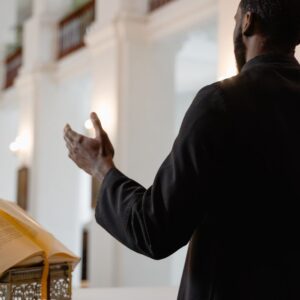Pastoring in today’s world is NOT for the faint of heart. Not only do clergy and religious leaders shepherd people’s spiritual lives, they are often expected to be counselors, friends, financial advisors, mentors and more.
Read more about pastoral stress and trauma
One Pastor’s Story of Handling Stress
Rev. Dr. J.P. Kang is a mentor that any pastor would be lucky to have. With 15 years in ordained ministry, J.P. is currently Pastor and Head of Staff of “Presby”, a diverse church that is also known as Japanese Presbyterian Church of Seattle.
At the Center for Transforming Engagement, we recently spoke with J.P. to ask him about managing stress as a pastor and leading effectively. Below are some of the leadership best practices we discussed.
Stress is part of pastoral ministry.
JP says we should start by accepting that stress is a part of pastoral ministry. A major source of stress for pastors is managing the pressure to perform while knowing that people in our congregations have different expectations about what’s important in a church, how a pastor should act, and what a pastor should do.
It helps to be realistic about human nature. “Accepting that people will act in human ways to try to get a church to conform to our expectations can free us to release those expectations and focus on the ministry that God is calling us to do.”
Value process over getting our own way.
J.P. said that sharing power with his congregational leaders is key to both effectiveness and to reducing stress because it results in a shared ownership of the ministry. “I take seriously that power is shared–that the pastor is not a benevolent dictator–so the process is important. Voices need to be heard. If I do (leadership) right, I may not get the result I personally wanted–and that’s okay.” The definition of success in ministry then shifts from perfect programming to building relationships that have integrity and commitment. J.P. offered this reframing: “Programs exist to provide context for relationships to grow, and relationships are the currency of ministry.”
Prioritize self-awareness.
J.P. shared how he has benefited from being part of a tradition that emphasizes that accurate knowledge of self leads to greater knowledge of God. One practice that increases his self-awareness is monthly meetings with a spiritual director.
“Spiritual direction helps me know what the emerging themes are in my life and vocation,” he said, sharing an example of his spiritual director asking a simple but profound question that revealed a core theme of wanting people to experience abundant life. This insight “helped me check my motivations” as he planned upcoming events and managed the stress of wanting good attendance and smooth logistics.
Plan for good communication.
Be sure to build time into your schedule to plan effective communication. This is a best-practice that J.P. wished he knew when he was starting out. He now takes the time to look ahead to the next quarter year of ministry, so that he can take into account the interconnection and ripple effects of decisions. He also blocks out time to craft thoughtful emails rather than off-the-cuff responses.
Accept your limitations.
Accepting our limitations as an act of faith that gives us the chance to practice perspective. “I remind myself that it’s not about me,” J.P. said. “I’m in this role for a time, and I need to be putting my faith into practice. We confess that God cares for us, but the rubber hits the road for me when I feel depleted. Then I need to be able to say that my preparation will have to be enough. I have to let go of needing to perform and meet people’s expectations.” Pastors need to know that “our identity is not in the last sermon we gave or the last event you did.”
Hone in on your vocation.
J.P. said it is important to take the time to reflect on our story and return to it regularly. “I’m big on vocation–finding the shape of our call, bringing the threads together,” he noted. In his work with ordination candidates, he saw the importance of people discovering “this is what I was made to do. Vocation is what brings the different pieces of life together.”
Meet with a peer group.
In ministry we need to intentionally be in a community with peers who are not part of our immediate congregation. J.P. meets with 4 other pastors in different states over Zoom every 2 weeks: this group has been “such a safe space for me to share and process and get support.” These pastors met each other at a preaching conference, and since then they have been a “lifeline” to each other and marked major life events together.
Rev. Dr. J. P. Kang received his M.Div. and Th.M. (Bible) at Princeton Theological Seminary and a Ph.D. in Bible from Union Presbyterian Seminary. In addition to serving as the Pastor and Head of Staff at Japanese Presbyterian Church of Seattle, he teaches biblical languages and literature at The Seattle School of Theology & Psychology.
The Center for Transforming Engagement equips individuals and teams to (re)build communities marked by resilience, belonging, and generativity. We offer small groups, workshops, and training to increase the personal and organizational resilience of individuals, congregations and nonprofits.
Interested in a program specifically designed to help leaders build resilience and manage stress? Resilience Circles for Leaders will begin January 2025. Send us a note and we will send you some more information.










0 Comments